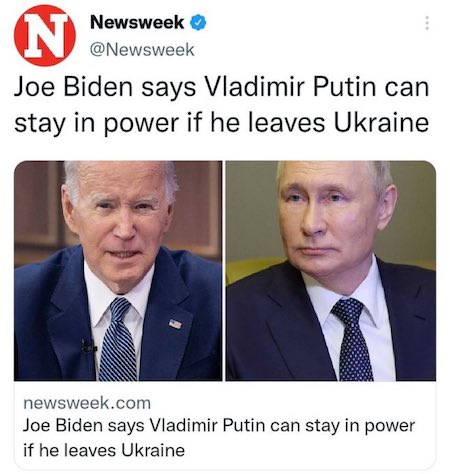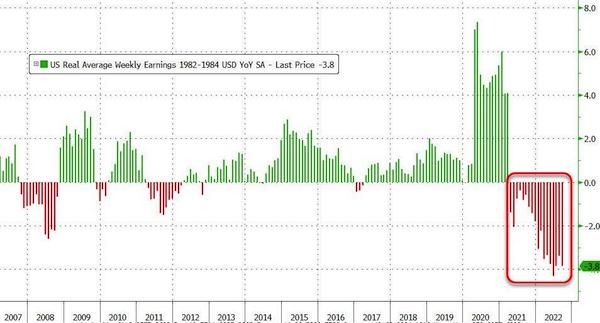
Salvador Dali Pianc 1919





Biden flyweight
— illuminatibot (@iluminatibot) October 13, 2022





Candace
"I'm wearing this shirt. It is the BLM symbol, but instead I've inserted some cash into it b/c what they really did is they robbed Americans." – @RealCandaceO
Pre-order your #GreatestLieEverSold shirt today! 0% of the profits go toward BLM.
Shop here: https://t.co/Cf5DvwJFFo pic.twitter.com/malGjcrkkp
— Daily Wire (@realDailyWire) October 13, 2022




No nukes, no nazis, no NATO.
• Ukraine Has De Facto Joined NATO – Defense Minister (RT)
Ukraine is a de facto member of the NATO alliance, despite not having officially joined the US-led military bloc, Kiev’s Defense Minister Aleksey Reznikov has claimed. He made the statement in a tweet following a meeting with NATO Secretary General Jens Stoltenberg at the bloc’s headquarters in Brussels on Wednesday. “We have come a long way and have de facto joined the alliance,” the minister wrote, while also thanking Stoltenberg for his support for Ukraine amid its ongoing conflict with Russia. “Ukraine is already making significant contributions to the security of the free world,” the minister added.
Reznikov also expressed confidence that victory over Moscow and “successful reforms” domestically would “open up new horizons” for his country, seemingly a reference to Ukraine officially joining the bloc at some point in the future. Russia views NATO’s eastward expansion as a major security threat. When Moscow launched its military offensive against Kiev in late February, one of its key demands was for Ukraine to officially declare itself a neutral country that would never join any Western military alliance. On September 30, Ukrainian President Vladimir Zelensky filed an application to join NATO and called for an accelerated admission procedure for his country.
However, Kiev’s backers in the West have not appeared overly enthusiastic on the issues. Stoltenberg has pointed out that “any decision on membership has to be taken by consensus” by all 30 NATO members and that its top priority right now is to “support Ukraine”militarily and financially during the conflict. Washington voiced a similar stance, with US National Security Advisor Jake Sullivan saying earlier this month that the question of Ukraine joining NATO “should be taken up at a different time.”A statement in support of Kiev’s bid for swift accession has been backed by just nine member states – the Czech Republic, Estonia, Latvia, Lithuania, North Macedonia, Montenegro, Poland, Romania and Slovakia.

“The events are normal..” [..] “But we don’t know, of course, what’s being exercised, whether that is also normal.”
• NATO, Russia to Hold Nuclear Exercises Despite Tensions (Gordon)
Russia and NATO will go ahead with large-scale nuclear exercises in the coming weeks despite concern over Russian President Vladimir Putin’s hints that the Ukraine war might prompt him to turn to his nuclear arsenal, U.S. and NATO officials said. The NATO exercise, called Steadfast Noon, involves American nuclear-capable B-52 bombers and fighter jets, which will not carry live munitions, White House National Security Council strategic communications coordinator John Kirby told reporters Oct. 13. The upcoming NATO exercise involving 14 countries has been long planned, and NATO Secretary General Jens Stoltenberg said delaying or canceling the exercise would send the wrong message about NATO’s resolve in the face of Russian aggression.
“It would send a very wrong signal if we suddenly now canceled a routine, long-time planned exercise because of the war in Ukraine. That would be absolutely the wrong signal to send,” Stoltenberg said. “NATO’s firm, predictable behavior, our military strength, is the best way to prevent escalation.” The U.S. twice put off routine tests of its Minuteman III missile this year, the first time to avoid inflaming tensions with Russia during the Ukraine crisis and the second time to avoid any miscalculation on China’s part as the Chinese military engaged in a show of force near Taiwan. A Minuteman III test launch eventually took place Aug. 16.U.S. officials predicted that Russia would soon go ahead with its own large-scale nuclear exercises.
The Russian drills would be the second since February 2022. Putin oversaw the February exercise that tested sea, land, and air-based ballistic and cruise missiles and other weapons. “We expect Russia to conduct its annual strategic nuclear exercise—they call it GROM—as early as this month,” Kirby added. The Western officials cautioned that the Russian exercise was expected and did not appear to be linked to Putin’s suggestions that Moscow might resort to nuclear weapons in the face of setbacks in Ukraine. In a national address Sept. 21, Putin warned that “Russia will use all the instruments at its disposal to counter a threat against its territorial integrity.” He added, “This is not a bluff.”
“We will monitor that as we always do,” Stoltenberg said of the upcoming Russian exercise. “And, of course, we will remain vigilant, not least in light of the veiled nuclear threats and the dangerous rhetoric we have seen from the Russian side.” Some nuclear policy experts expressed concern that Russian and NATO nuclear exercises might heighten apprehensions as each side seeks to determine what options might be tested. “The events are normal,” said Hans Kristensen of the Federation of American Scientists in an interview. “But we don’t know, of course, what’s being exercised, whether that is also normal.”

“..if a nuclear strike is decided on, it will be directed against the centre, not the periphery…”
• The Anti-Nuclear Movement in Review: Defeat from the Jaws of Victory (Hall)
What it seems the Russians are doing in the face of US “nuclear sabre-rattling” is taking a leaf out of Kennedy’s book. Faced with nuclear missiles (or what were claimed to be nuclear missiles) in Cuba, Kennedy was under pressure to invade Cuba to take them out. Khrushchev appears to have been influenced by notions of “nuclear deterrence”. He apparently thought that the US might invade Cuba but that the “nuclear deterrence” exerted by the Russian nuclear arsenal would dissuade the US from threatening the Soviet Union itself. In fact Kennedy defied all his advisors to tell Khrushchev that if he didn’t get his missiles (or “missiles”) out of Cuba, the US would launch a massive nuclear first strike against Soviet cities.
This made Khrushchev lose his nerve and he backed down. Subsequently he and Kennedy embarked on serious negotiations to move towards nuclear disarmament, or at least more effective arms control. Kennedy gained kudos from his brinkmanship, but also made enemies, and not only from peace loving, or “peace loving” ideological opponents. He also incurred the displeasure of leading lsraeli politicians, notably Ben Gurion, through his opposition to Israel having nuclear weapons. So for this and other reasons he was assassinated. What Putin appears to be doing now is similar: faced with the threat of a local conflagration he says that if a nuclear strike is decided on, it will be directed against the centre, not the periphery.

“..Moscow is, however, still open to dialogue, but that no “sensible” offers have so far been forthcoming from Washington.”
• ‘It Can’t Get Any Worse’ – Lavrov On US-Russia Relations (RT)
US President Joe Biden’s latest remark indicating his unwillingness to negotiate with his Russian counterpart is unlikely to further worsen an already dire global security situation, Russian Foreign Minister Sergey Lavrov has said. The diplomat noted that Moscow is, however, still open to dialogue, but that no “sensible” offers have so far been forthcoming from Washington. In an interview with Russia’s Rossiya 24 news channel aired on Thursday, Lavrov was asked whether he thought Biden’s reluctance to talk with Russian President Vladimir Putin would further complicate tensions in the international arena.“It doesn’t complicate [it] at all, because the state of affairs as it stands today has already been driven, first of all by the US, to such a condition that it can’t get any worse, in my opinion,” the Russian minister replied.
The diplomat pointed out at the same time that Moscow is not shunning dialogue with Washington. According to Lavrov, Russia has “never rejected a single earnest, sensible offer to hold contacts.” However, “no one is putting forth sensible initiatives,” he added. Speaking to journalists on Wednesday, White House Press Secretary Karine Jean-Pierre said that president Biden “has no intention of meeting with President Putin.” The statement echoed a remark made by the US head of state to CNN’s Jake Tapper on Tuesday. “Look, I have no intention of meeting with him,” Biden said, when asked about his plans for the upcoming G20 summit in Bali.
The US president went on to add, however, that “if [Putin] came to me at the G20 and said ‘I want to talk about the release of Griner,’ I’d meet with him. I mean, it would depend. Brittney Griner is America’s Women’s National Basketball Association star and Olympic gold medalist who was detained at a Moscow airport in February and later sentenced to nine years in prison by a Russian court on drug-possession charges. Presidents Biden and Putin have not spoken to each other directly since before Russia launched its military campaign against Ukraine in late February. Lavrov had made it clear earlier that Moscow would consider such talks should it receive a proposal from Washington.

“Russia will not allow the Empire to control Ukraine, whatever it takes.”
• The Thin Red Line: NATO Can’t Afford To Lose Kabul And Kiev (Escobar)
As the Empire of Chaos, Lies and Plunder is petrified by the startling Double Fail of a massive economic/military attack, Moscow is systematically preparing for the next military offensive. As it stands, it’s clear that the Anglo-American axis will not negotiate. It has not even tried for the past 8 years, and it’s not about to change course, even incited by an angelic chorus ranging from Elon Musk to Pope Francis. Instead of going Full Timur, accumulating a pyramid of Ukrainian skulls, Putin has summoned eons of Taoist patience to avoid military solutions. Terror on the Crimea Bridge may have been a game-changer. But the velvet gloves are not totally off: General Armageddon’s daily aerial routine may still be seen as a – relatively polite – warning.
Even in his latest landmark speech, which contained a savage indictment of the West, Putin made clear he’s always open for negotiations. Yet by now, Putin and the Security Council know why the Americans simply can’t negotiate. Ukraine may be just a pawn in their game, but it’s still one of Eurasia’s key geopolitical nodes: whoever controls it, enjoys extra strategic depth. The Russians are very much aware that the usual suspects are obsessed with blowing up the complex process of Eurasia integration – starting with China’s BRI. No wonder important instances of power in Beijing are “uneasy” with the war. Because that’s very bad for business between China and Europe via several trans-Eurasian corridors.
Putin and the Russian Security Council also know that NATO abandoned Afghanistan – an absolutely miserable failure – to place all their chips on Ukraine. So losing both Kabul and Kiev will be the ultimate mortal blow: that means abandoning the 21st Eurasian Century to the Russia-China-Iran strategic partnership. Sabotage – from the Nord Streams to Krymskiy Most – gives away the desperation game. NATO’s arsenals are virtually empty. What’s left is a war of terror: the Syrianization, actually ISIS-zation of the battlefield. Managed by braindead NATO, acted on the terrain by a cannon fodder horde sprinkled with mercenaries from at least 34 nations.
So Moscow may be forced to go all the way – as the Totally Unplugged Dmitry Medvedev revealed: now this is about eliminating a terrorist regime, totally dismantle its politico-security apparatus and then facilitate the emergence of a different entity. And if NATO still blocks it, direct clash will be inevitable. NATO’s thin red line is they can’t afford to lose both Kabul and Kiev. Yet it took two acts of terror – on Pipelineistan and on Crimea – to imprint a much starker, burning red line: Russia will not allow the Empire to control Ukraine, whatever it takes. That’s intrinsically linked to the future of the Greater Eurasia Partnership. Welcome to life at Doom’s doorstep.

“His murder was bungled, on which Skripal and his daughter were then abducted and ‘disappeared’ (to New Zealand?)..”
• Lies, Lies, Lies (Batiushka)
[..] in 1854 Commodore Perry forced Japan by military threat to ‘trade with’ the USA, in order to ‘take it out of its isolation’ and that led to Hiroshima and Nagasaki. Those who lived in those two cities then much regretted their lack of isolation. And as for the USA? It was itself still in a state of cultural isolation, having learned nothing from age-old Japanese culture, but instead imposing its own anti-culture on all and sundry. Or then there was that war criminal General Curtis LeMay who boasted of his potential to ‘bomb back into the Stone Age’ in order to bring freedom and democracy, when in fact his brain was in the Stone Age and he had no idea what freedom and democracy are.
Or there is the statement that Russia is corrupted by oligarchs, when in reality ‘Russian’ oligarchs (most of them are Jewish) are purely Western creations from the 1990s, following the model of the only system that the Western world has ever practised – Feudalism, with its economic serfdom (2). What are Musk, Bezos, Gates and Buffett, if they are not oligarchs/feudal magnates? This technique was clearly displayed in the 2006 Litvinenko and 2018 Skripal cases in the UK. In the first case, a Russian traitor and British spy was murdered by polonium. Now, if you wanted to murder someone (who presented no threat to you) without incriminating yourself, would you rather not just employ a hired killer who would leave no trace? It would be much cheaper.
Interestingly, polonium is a very rare radioactive substance, but is available to British secret services. In the Salisbury case of the Skripals, involving a retired British spy, who seemed to be wanting to repent for his treason (he had already served his sentence in a Russian prison), and who was poisoned with a substance available in only about three places worldwide, one of which is twelve kilometres away from where he lived in one of the most fearsome chemical weapons establishments in the world. His murder was bungled, on which Skripal and his daughter were then abducted and ‘disappeared’ (to New Zealand?), though an innocent woman did die of the poison. When questions were asked about some very strange aspects of the case, the British media were issued with a ‘DSMA-Notice’, censoring them and forbidding them to report any further on the matter.

“$400 million over the next 12 months..”
• SpaceX Sends Ukraine Starlink Bill To Pentagon (RT)
Elon Musk’s aerospace firm has asked the US military to take over funding for its Starlink satellite internet service in Ukraine, saying it is no longer able to foot the cost of operations, according to company documents obtained by CNN. In a letter sent to the Pentagon last month, SpaceX outlined its financial difficulties and asked the government to begin funding Starlink services for Ukraine, claiming it will cost more than $120 million for the rest of 2022, and some $400 million over the next 12 months. “We are not in a position to further donate terminals to Ukraine, or fund the existing terminals for an indefinite period of time,” SpaceX’s director of government sales said in the letter.
SpaceX has donated around 20,000 Starlink satellite units to Ukraine since the beginning of the conflict in late February, providing internet connection and military coordination in chaotic battlegrounds that would otherwise be cut off from the web. Ukrainian officials have hailed the system as “an essential part of critical infrastructure.” Kiev has nonetheless urged the company to send thousands of additional Starlink terminals, with another letter obtained by CNN showing that a top Ukrainian general, Valery Zaluzhny, directly asked for 8,000 units back in July. An outside consultant for SpaceX later wrote that the firm “faces terribly difficult decisions here,” adding “I do not think they have the financial ability to provide any additional terminals or service as requested by General Zaluzhny.”
While Musk has stated that SpaceX will have spent more than $100 million providing Starlink services to Ukraine by the end of the year, the company’s letter to the Pentagon indicates that other parties have helped to bear some costs. The “vast majority” of the 20,000 units furnished to Ukraine have received “full or partial funding” from the American, British and Polish governments, as well as NGOs and private fundraisers, though SpaceX has covered most of the service costs of around $4,500 per terminal each month. More recently, SpaceX has come under fire for alleged Starlink outages across some regions of Ukraine, with the Financial Times relaying reports from Ukrainian soldiers of a “catastrophic”loss of communications last week. The cause of the outages remains unclear, though Ukrainian officials insist the problems were not the result of a technical glitch or cyberattacks, instead suggesting “SpaceX-imposed geographical restrictions.” Service has since resumed in the affected areas, however.

“George Washington Zelensky hopes to do this with the World Bank and has a role for the IMF.”
• Zelensky Shakedown: $62 Billion Before Next Year (Dowling)
The U.S. just approved another 13+ billion for Ukraine after they gave them $1.1 billion and hundreds of millions in weapons the two weeks before. Mr. Zelensky now wants $38 billion to cover their budget deficit, salaries of doctors and teachers, welfare, and pensions. In other words, we will pay their government workers. It sounds like a shakedown. He asked for $33 billion in August. Mind you, we don’t have a budget in the US. Ukrainian President Zelensky also wants $17 billion for critical infrastructure, $2 billion for electric energy infrastructure, and more than $5 billion for gas and coal purchases. Most of the money will come from the US.
He wants new business investments in Ukraine while at war with Russia. He wants a mechanism “to ensure military risks” taken by these businesses. George Washington Zelensky hopes to do this with the World Bank and has a role for the IMF. The Ukrainian president wants a permanent working group to dole out funds promptly. It sounds like this will set up automatic payments. Zelensky also wants to rebuild while the war is ongoing. This demand for funds comes as the US exceeds a $31 trillion debt and trillions in deficit in the year’s expenditures. These expenditures will go on without end as the US hits record-high inflation that shows no signs of stopping. Is there anyone we can shakedown for money? We’ll need a benefactor with the Zelensky burden.
Zelenskyy (@ZelenskyyUa): Ukraine needs $38 billion to cover our budget deficit next yr; we need $17 billion to "rebuild the critical infrastructure"; we need $2 billion to rebuild our "electric energy infrastructure"; & we need "not less than $5 billion" for gas & coal purchases pic.twitter.com/8WpHrdMwQQ
— Tom Elliott (@tomselliott) October 13, 2022
Tucker Ze
https://twitter.com/i/status/1580717198703611904

Borrell: you lost.
• EU Concerned Over UN Vote On Ukraine – Borrell (RT)
EU foreign policy chief Josep Borrell has expressed disappointment that more countries didn’t support the UN’s latest resolution on the non-recognition of referendums on joining Russia in the Donetsk and Lugansk People’s Republics and in Zaporozhye and Kherson regions. Speaking at the European Diplomatic Academy on Thursday, Borrell said he was happy that “the system reacted very well” after 143 countries in the UN General Assembly voted to reject the referendums, with only five countries, including Russia, voting against the resolution. “There was a lot of work behind [this result], a lot of outreach to many people in order to be sure that we were above the 140 line,” the top diplomat said. However, Borrell went on to state that he was “worried because there were too many abstentions,” as 45 countries, including China, India, South Africa, Thailand and Cuba, chose to refrain from casting their vote for the resolution.
“When more or less 20% of the world community decided not to support or not to reject the Russian annexation – for me, it is too many,” said the diplomat, adding that “we are happy because the bottle is quite full, but it is a little bit empty.” Borrell insisted that more work must be done to convince more countries to condemn Russia and “make the world reject” Moscow’s military campaign against Ukraine. The diplomat’s comments come as Russia accused the US and its allies of using “diplomatic terror” to force more countries into supporting the UN resolution. Russian Foreign Minister Sergey Lavrov said on Thursday that Western nations were “twisting the arms of developing countries and threatening them with all sorts of punishments” in order to get them to condemn Russia.
“Only through such undisguised blackmail and threats did they manage to ensure the result. We all understand perfectly. And the statements of the Americans that they are not persuading anyone, and that everyone is voting by themselves, is a lie. And they also know it,” Lavrov said. Before launching its military operation in Ukraine in February, Russia recognized the sovereignty of the Donetsk and Lugansk People’s Republics, arguing that Kiev had failed to represent and protect people living there. Residents of two other regions, Kherson and Zaporozhye, also voted by wide margins in public referendums to declare independence and join Russia. President Vladimir Putin signed unification treaties with the four new Russian regions on October 5.

“..our elected officials have not just bounced up against the guardrails enshrined in the Constitution, they have flattened them and are driving the republic off a cliff.”
• Why Have a Constitution If You Just Ignore It? (Miele)
In two recent columns, I wrote about the danger of public officials who are either unaware of the restrictions placed upon them by the Constitution they have sworn to uphold or, worse, just don’t give a damn. In the first, I chided President Biden for his sworn intent to pass a law that would “codify Roe v. Wade into law,” namely to pass a federal law that offers protection for abortion nationwide. In the second, I lambasted Sen. Lindsey Graham of South Carolina for proposing a bill that would ban abortion after 15 weeks gestation, the point when unborn children are believed to be able to feel pain. So that raises the obvious question: Why have a Constitution if you are just going to ignore it? Democrat Biden and Republican Graham together offer a bipartisan illustration of why our country is dangerously off track.
With the implicit permission of the Supreme Court, our elected officials have not just bounced up against the guardrails enshrined in the Constitution, they have flattened them and are driving the republic off a cliff. It doesn’t matter which side of the abortion issue you are on; we should all be able to agree that in a constitutional republic, lawmakers and presidents cannot just do whatever they want. And there is absolutely no doubt that the U.S. Constitution does not give Congress the power to regulate medical procedures, whether it be an abortion or an appendectomy. That’s just the starting point. Anyone who bothers to read the Constitution knows that Congress was designed to exert limited authority over Americans’ everyday lives. Read Article I, Section 8 if you don’t believe me. You won’t find anything about vaccines or masks, and the whole idea of presidents ordering citizens to do anything is laughable.
Article II, Section 2, which spells out most of the powers of the president, is remarkably brief, and the powers are few. Commander in chief? Check. Negotiator of treaties? Check. Nominator of ambassadors and judges? Check. But from where exactly does the president derive the power to forgive student loans? Or order landlords to stop collecting rent? Maybe this runaway tyrannical democracy could have been avoided if we still taught civics in our elementary and secondary schools. But at this point there is little to be done. We can’t force members of Congress to read the Constitution, let alone understand it. We can’t stop presidents from legislating with their phone and their pen, as President Obama famously called his ability to unilaterally shape America to his wishes through executive order. And we are decades past the point where we could expect courts to rein in the excesses of the other two branches.>

“That was a clear push for mercy — from the ultimate boss of the Justice Department that’s weighing charges against Hunter.”
• Joe Biden Just Interfered In Hunter’s Prosecution On National TV (NYP)
President Biden shouldn’t be talking about his son Hunter’s case, let alone defending him as he did Tuesday night to Jake Tapper. “I’m proud of my son,” who got “hooked on drugs” but has “established a new life,” the prez said: “He’s on the straight and narrow, and he has been for a couple years now.” That was a clear push for mercy — from the ultimate boss of the Justice Department that’s weighing charges against Hunter. As we’ve asked before, how is there no independent counsel in charge of this case, as department rules clearly dictate? It’s pretty clear that Justice has already delayed this investigation.
Then, too, the prez only discussed Hunter’s admitted lies on a federal gun form, not the far more serious tax-dodging charges (or the unregistered-lobbyist issues, let alone the whole “Big Guy” stinkbomb) — and Tapper didn’t push him. Casual viewers might well think mercy is indeed called for, and much of the media will back them up. But the real Hunter case is about selling influence with Joe Biden, quite likely to Joe’s financial benefit. This wasn’t a parent supporting his offspring, but a potential co-conspirator pushing to quash a case that implicates him.

“Biden then threatened to withhold Congressionally authorized arms sales to Saudi Arabia..”
• Saudi Arabia Publicly Rejects Biden Demand To Delay Oil Production Cutback (PM)
The Biden administration urged Saudi Arabia and other OPEC+ members to delay announcing oil production cuts until after the November mid-term elections. Gas prices are foremost in the minds of American voters and are expected to play a major role in the control of Congress in the minds of voters. Saudi Arabia refused to go along with Biden’s wishes, saying that they would be reducing their oil production, as would their Russian allies. Biden then threatened to withhold Congressionally authorized arms sales to Saudi Arabia, making the stunning admission during a recent sit-down interview with CNN’s Jake Tapper, in which he stated that Saudi Arabia would face “consequences for what they’ve done with Russia.”
Biden asked Saudi Arabia to delay their decision to cut oil production, and to drill more oil in the lead up to the November midterm elections, essentially to boost the Democratic Party by cutting gas prices. The administration has claimed that the ask to Saudi Arabia to delay their cutback on oil production was not at all a political move, however, Saudi Arabia said that it was. They stated further that they are not taking a stance on the Ukraine-Russia conflict, and that their decision to cut production was an economic, not a political one. Holding Congressionally authorized foreign funding hostage over a political conflict, or to coerce a nation into behaving according to the wishes of the White House, is exactly what Biden accused former President Trump of doing three years ago, which led directly to Trump’s impeachment.
Here is Biden in 2019 calling for Trump to be impeached for the exact same thing Biden is doing right now with Saudi Arabia https://t.co/RegYqshj3W
— ShapiroExposed.com (@JackPosobiec) October 12, 2022
Tapper seemed oblivious to this conflict, but Human Events Daily Senior Editor Jack Posobiec pointed it out on Twitter, saying “Here is Biden in 2019 calling for Trump to be impeached for the exact same thing Biden is doing right now with Saudi Arabia,” and quoting then-candidate Biden. “Have we caught Joe Biden admitting to coercing a foreign country in furtherance of his own political interest? Yes, we have because he admitted it on live TV,” Posobiec said on Human Events Daily. Biden, he said, “explicitly states that he is going to coerce Saudi Arabia by holding up congressionally approved military aid.” “He’s saying ‘I’ll pull military aid,'” Posobiec said, pulling up Biden’s 2019 tweet.
[..] “Back then it was Trump and Ukraine. Now it’s Biden in the Saudis. So the question is simple: this was only the third impeachment in the history of the United States of America, and it was predicated on this theory of a quid pro quo between the two presidents.” “They know what they’re doing,” Posobiec said. “They all know what they’re doing. It’s not hypocrisy, it’s hierarchy.” “President Biden can sit there and admit that he’s coercing the Saudis, the same way that he admitted before, but he was coercing the Ukrainians with a $1 billion loan to get the Ukrainian prosecutor fired. This guy is the father of the quid pro quo when it comes to modern American government.”

Very few people left that believe in Durham.
• John Durham Unmistakably Puts FBI On Trial (JTN)
Igor Danchenko is the named defendant at this week’s trial, charged with lying as an informant in the now discredited Russia collusion investigation. But with probing questions and searing redirects, Special Counsel John Durham has turned the Russian researcher’s trial in the U.S. District courtroom in Alexandria, Va., into an expose of stunning FBI failures and omissions in its now-infamous pursuit of Donald Trump for crimes that turned out to be nonexistent. While the Hillary Clinton-spawned Russian collusion narrative has been the subject of a half dozen exhaustive investigations in the House, Senate and Justice Department, Durham has managed to use his third and widely assumed last trial to drop bombshell after bombshell that other inquiries failed to uncover. Even the most versed in the case have been stunned.
The effort began during pretrial motions. Danchenko, the primary source for the now-debunked Steele dossier, was someone who had both lied to FBI agents and had troubling ties to Russian intelligence. But Durham revealed he was inexplicably hired by the bureau, despite that record, to be a paid confidential human source for three years. Durham followed that with a stunner on day 1 of the trial, getting FBI senior analyst Brian Auten to reveal that the FBI had been unable to confirm a single fact in the Steele dossier by mid-October 2016 but nonetheless grabbed some of its most sensational claims about Trump and stuck them into a Foreign Intelligence Surveillance Act warrant marked “verified” that authorized spying on the Trump campaign and former adviser Carter Page.
“On October 21, 2016, did you have any information to corroborate that information?” Durham asked, referring to the Carter Page FISA application submitted on that date. “No,” Auten replied. The bureau was so desperate to find corroboration to justify Steele’s allegations that it offered up to $1 million to former British MI6 agent Christopher Steele, a paid researcher for Hillary Clinton’s campaign, if he could corroborate his dossier. Steele did not, Auten told the jury.That revelation even shocked former House Intelligence Committee Chairman Devin Nunes, who conducted the first exhaustive probe that debunked the dossier and exposed FBI wrongdoing. Nunes told Just the News on Thursday he was never told about the $1 million payment despite subpoenaing the FBI.
“I hate to say this, but like a new shoe drops every day,” Nunes told the John Solomon Reports podcast in referring to Durham’s work. “And it’s like every day we find out something new. And I mean, look, I don’t know how you describe this $1 million payment or potential payment to Steele as anything other than what it is. It was a bounty program to get Donald Trump.”

“The Biden White House even sought a “stable, predictable” relationship with Russia.”
• Biden’s ‘Schizophrenic’ National Security Strategy (RSC)
The Biden administration has finally released its long-awaited National Security Strategy, the first such document since 2017. It’s strikingly schizophrenic, alternating — sometimes on an almost sentence-by-sentence basis — between ambitious promises to lead global cooperation in addressing transnational challenges, and depicting a world of near-intractable rivalries. The overall impression is of a foreign policy establishment that seems to understand the need for international cooperation, but also seems helplessly carried along by currents that could divide the world in a way that makes such cooperation impossible. This reflects the journey of the Biden administration itself.
President Biden came into office promising to refocus foreign policy domestically on the needs of the American middle class, to lead global cooperation against the climate crisis, and with apparent plans to lower conflict in global flash points. He planned to rejoin the nuclear deal with Iran as a way to ramp down tensions there, and intended to maintain cooperation with China in key selected areas even as the administration maintained much of the Trump administration’s shift toward a hard-edged “strategic competition” with China. The Biden White House even sought a “stable, predictable” relationship with Russia. Its first major foreign policy decision was to disentangle the United States from its two-decade military occupation of Afghanistan.
Two years later, the world instead seems to be teetering on the brink of a new cold war with all the dangers and costs that it implies. Cooperation between China and the United States is in a deep freeze because of a seemingly endless series of tit-for-tat provocations, especially over Taiwan, and the president’s own party is pressuring him to be even more aggressive. Meanwhile, negotiations to restore the Iran nuclear deal are bogged down and during this summer’s trip to the Middle East, Biden seemed to threaten war. In Ukraine, after helping to decisively thwart Putin’s initial bid to conquer the country, Washington seems satisfied to settle in for a long and vicious conflict with no effort to seek a diplomatic way out.
While our core allies in Europe and Japan stand with the United States against both Russia and China, many critical nations in the Global South, including some of the world’s largest democracies in India and Brazil, have failed to join the United States in unequivocally denouncing the Russian invasion. Furthermore, the Biden administration’s rhetoric has shifted from a “foreign policy for the middle class” to calls for a potentially apocalyptic confrontation between “democracies and autocracies.”

Let’s see him do it.
• Will Musk “End Twitter As We Know it”? I Sincerely Hope So (Turley)
The news that Elon Musk wants to go forward with the purchase of Twitter has led to a virtual panic among media, political and academic figures worried that free speech could shortly break out on the social media platform. Former Politico magazine editor Garrett Graff summed up the collective vapors succinctly: “Be afraid, be actually afraid.”I sincerely hope so. While Musk had in recent months wavered on his purchase, he said last week that he wants to move forward with a $44 billion offer to buy the social media platform. On Thursday, the judge presiding over Twitter’s lawsuit against Musk for backing out of the original deal gave the world’s richest person until Oct. 28 to reach an agreement on the purchase. The free speech community hopes that Musk is still committed to his stated commitment to return free speech protections to the social media giant.
In the past 10 years, a censorship culture has not only become deeply embedded at Twitter but also on other social media platforms. The need for censored and limited speech has become an article of faith for many on the left. I have long admitted to being an “internet originalist,” someone who viewed the internet as the greatest development for free speech since the invention of the printing press. However, the rapid erosion of free speech values – from our Congress to our campuses – has been alarming. Led by President Joe Biden, Democratic leaders and media figures have demanded corporate censorship and even state censorship to curtail opposing views on issues ranging from climate change to election integrity to public health to gender identity. The Washington Post’s Max Boot, for example, declared, “For democracy to survive, we need more content moderation, not less.”
Now these same figures are fearful of the supposed menace that Musk poses – the prospect that a major social media platform could actually restore free speech protections.It would reverse the anti-free speech policies of Twitter CEO Parag Agrawal, who has pledged to regulate content as “reflective of things that we believe lead to a healthier public conversation.”Agrawal said the company would “focus less on thinking about free speech” because “speech is easy on the internet. Most people can speak. Where our role is particularly emphasized is who can be heard.”Agrawal’s policy of “who can be heard” offers a reverse model for how to develop a new culture at Twitter. Indeed, his emphasis on the limits of the First Amendment is precisely where Musk should start.




Christine Anderson
Christine Anderson MEP @AndersonAfDMdEP calls the EU Covid Committee incompetent to serve the best interests of the people. This now opens for a formal Parliament's committees of inquiry.pic.twitter.com/PE7IGUtyf3
— Sikh For Truth (@SikhForTruth) October 11, 2022



Real earnings




Naturally grounded
“I wonder if it’s possible that humans are no longer naturally grounded.” pic.twitter.com/nFmSeqKXoH
— Mr Smith (@WestwoodParking) October 14, 2022
The above clip is from “The Earthing Movie”



Support the Automatic Earth in virustime with Paypal, Bitcoin and Patreon.









